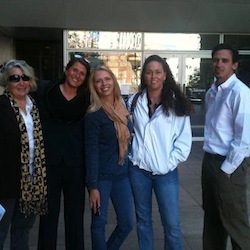Louisiana residents Cherri Foytlin, Kindra Arnesen, and Michelle Chauncey were asked by Judge Barbier to leave for allegedly "live streaming audio" of the hearings, and were escorted out by U.S. Marshals. The women were quietly listening to the proceedings and say they had no intention of interrupting, and don't even know how to "live stream". They believe they were unjustly targeted because they have been speaking out for their families and their communities. (Read Foytlin's take on the hearing here.)
"It's ironic -- this is exactly the place where objections are meant to be heard and instead, we have four Louisiana residents forcibly removed because the court felt threatened that they might speak out," says Bryan Parras of Houston, Texas - an environmental justice expert and Managing Advisor with the Gulf Coast Fund for Community Renewal and Ecological Health.
The fairness hearing is the final step before Judge Barbier decides whether to grant final approval of the class-action settlement reached between BP and the Plaintiffs' Steering Committee (PSC). The settlement covers economic and medical damages to individuals and businesses harmed by the BP oil spill, and BP estimates it will cost roughly $7.8 billion. Barbier is expected to grant final approval of the settlement in the next few days.
After the women were removed, the court heard objections to the medical component of settlement. Attorney Robert McKee argued that the narrow range of ailments that would be compensated by the settlement - eye, nasal, respiratory, and skin problems that appeared within 24 to 72 hours of exposure to oil - will leave out thousands of people who have become seriously ill from the disaster, including those with liver, kidney, and chromosomal damage. (Dr. Mike Robichaux, a Louisiana physician who has treated over 100 people with illnesses he attributes to the BP oil disaster, issued a similar statement earlier this week, saying, "If the BP-PSC agreement is accepted, the very serious illnesses being suffered by a large number of victims will be trivialized and these patients may lose standings in their lawsuits because of this flawed decision.")
Judge Barbier responded to McKee that people with more serious ailments could opt-out of the settlement and pursue their own litigation.
Next, Attorney Jason Melancon objected to the settlement on behalf of this clients, low-income and mostly non-English speaking Hispanic men and women who were bussed into Louisiana to work on the clean up. He argued that these workers will face practical problems in getting fair compensation because they cannot afford to go to a doctor and get the tests needed to document their illnesses. The medical settlement uses a matrix (download) in which monetary awards are based on both the types of ailments and the level of proof the claimant provides. Melancon argued that his clients would only be eligible for the lowest amount for clean-up workers, $1,300, a lump sum that would not be enough to cover their much-needed ongoing health care.
Around the time Melancon delivered his objection inside the federal courtroom, Kindra Arnesen shared a similar concern from the street outside. The settlement would likely allow her and her husband to receive damages as former clean-up workers, but she worries her sick children will be excluded. "Pediatricians treat them for everything but chemical exposure. Without the acknowledgement of physicians, there's nothing you can do," she said.
Arnesen began to cry as she continued, "I'm sitting there watching these kids get sick - antibiotics, steroid shots, scrubbing blood out of pillow cases after slumber parties because they are waking up with nose bleeds. They've done zero for these kids; they've done zero for these families" And I'm not allowed to sit quietly in a courtroom?"
Targeting the Directly-Impacted
Arnesen and Chauncey are plaintiffs in the class action, and Foytlin has been directly impacted by the BP disaster as well.
Michelle Chauncey sold crabs in Westwego, Louisiana until the BP disaster put her out of business, and now works with a number of fishery groups. One of those groups, the Gulf Organized Fisheries in Solidarity and Hope (GO FISH) coalition, offered objections to the settlement at the hearing.
"I was unfairly denied my right to be in a courtroom that holds my life in its hands," Chauncey reflected, "while all the lawyers who are there just to make more money got to stay."
Arnesen, also a member of GO FISH, lives in Buras, Louisiana, a fishing community rocked by the disaster and its economic, health, and environmental fall-out. Her husband is a fisherman, and both of them have developed chronic health problems after working to clean up the disaster."
Cherri Foytlin, of Rayne, Louisiana, is a journalist who became sick after reporting on the BP disaster for her local newspaper. Foytlin's husband, an oil worker, was out of work during the moratorium on drilling that followed the spill. (Foytlin and Arnesen are both Bridge The Gulf contributors as well).
(Note: You can view every article as one long page if you sign up as an Advocate Member, or higher).






